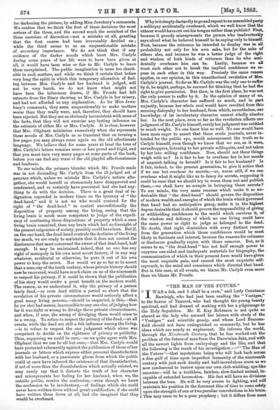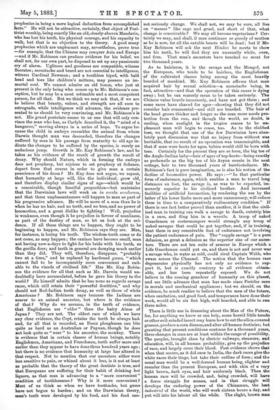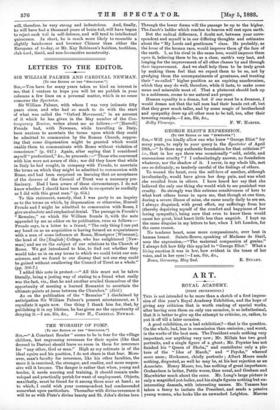"THE MAN OF THE FUTURE."
" IWAS a fish, and I shall be a crow," said Lady Constance Rawleigh, who had just been reading the "Vestiges," to the horror of Tancred, who had thought the young beauty spiritual, and had dreamt of making with her a pilgrimage to the Holy Sepulchre. Mr. E. Kay Robinson is not quite so absurd as the lady who amused her leisure with study of the "Vestiges" and scientific gossip, and whom Lord Beacons- field. should not have extinguished so summarily, but he has ideas which are nearly as unpleasant. He informs the world, through the Nineteenth Century, that he has worked-out the problem of the future of man from the Darwinian data, and with all the newest lights from embryology and the like, and that the following is the result of his investigation :—" The Man of the Future '—that mysterious being who will look back across a dim gulf of time upon imperfect humanity of the nineteenth century with just such kindly and half-incredulous scorn as we now condescend to bestow upon our own club-wielding, ape-like ancestor—will be a toothless, hairless, slow-limbed animal, in- capable of extended locomotion. His feet will have no divisions between the toes. He will be very averse to fighting, and will maintain his position in the foremost files of time to come solely upon the strength of one or two peculiar convolutions in his brain. This may seem to be a poor prophecy ; but it differs from most prophecies in being a mere logical deduction from accomplished feats." He will not be attractive, certainly, that object of Posi- tivist worship, being exactly like an oh, closely-shaven Mandarin, who has lost his teeth, his physical courage, and his capacity to walk, but that is no objection to the theory. A good many prophecies which are unpleasant may, nevertheless, prove true —for example, that the Chinese may conquer Asia and Europe —and if Mr. Robinson can produce evidence for his belief, we shall not, for our own part, be disposed to set up any passionate cry of alarm. Ugliness and goodness are compatible, witness Socrates ; moustache and beard are not essential to intelligence, witness Cardinal Newman ; and a toothless biped, with bald head and toes like children's mittens, may possess an im- mortal soul. We cannot admire an old bonze, who just at present is the only being who comes up to Mr. Robinson's con- ception, but he may be a most estimable and a most competent person, for all that. But we think we may ask that, if we are to believe that beauty, valour, and strength are all sure to retrograde, while intelligence will advance, the evidence pre- sented to us should be very convincing, and Mr. Robinson's is not. His grand postulate seems to us one that will only con- vince the man who has, as Carlyle described it, the "mind of a kangaroo," moving always in a series of hops. To argue be- cause the child in embryo resembles the animal from whom Darwin thought man was descended, therefore the changes suffered by man in his passage from maturity to old age in- dicate the changes to be suffered by the species, is surely an audacious jump. Growth is Mr. Kay Robinson's law, and he takes as his evidence of the result of growth the result of decay. Why should Nature, which in forming the embryo does not prophecy, but rejoices to set prophecy at defiance, depart from that course in order to give man a certain prescience of his doom ? Mr. Kay does not argue, we repeat., that humanity at large will, like the individual, grow old, and therefore display similar signs of age—which would be a conceivable, though fanciful proposition—but maintains that the Darwinian laws will work on in secula seculorum, and that these unpleasantnesses will happen to man as part of his progressive advance. He will be more of a man than he is when he has no hair, and no teeth, and no toes,-and no power of locomotion, and a great dislike to fighting ! Well, prejudice is weakness, even though it be prejudice in favour of manliness, as part of the destiny of man, so let us look at the evi- dence. If all these things are to happen, they ought to be beginning to happen, and Mr. Robinson says they are. Man, for instance, is losing his teeth. The wisdom-teeth come or do not come, as may happen ; the canines have become small, man not having now-a-days to fight for his bride with his teeth, as the gorilla does; and teeth in general are decaying much earlier than they did.. They will, therefore, disappear, "probably two at a time," and be replaced by hardened gums, "which cannot fail to be incomparably more convenient and suit- able to the viands of civilised life." Has Mr. Kay Robin- son the evidence for all that such as Mr. Darwin would un- doubtedly have accumulated, before he gave his theory to the world P He himself admits that he has none as regards savage races, which still retain their "powerful dentition," and why should not Red-Indian teeth decay, as well as those of white Americans ? Mr. Robinson says because the Indians are nearer to an animal ancestor, but where is the evidence of that P Why do we assume, in the teeth of evidence, that Englishmen are " older " than the hairy Ainos of Japan P They are not. The oldest race of which we have any clear evidence, the Copt, retains the teeth he always had, and, for all that is recorded, an Essex ploughman can bite quite as hard as an Australian or Papuan, though he does not look quite so " near " to his ancestor, the monkey. There is evidence that in certain classes of human beings, notably Englishmen, Americans, and Frenchmen, teeth suffer more and earlier than they appear to have done three hundred years ago ; but there is no evidence that humanity at large has altered in that respect. Not to mention that our ancestors either were less sensitive to pain, or whined about it less, is it not at least as probable that the theory of the great dentists is true, and that Europeans are suffering for their habit of drinking hot liquors, as that man is advancing to a "more convenient" condition of toothlessness P Why is it more convenient ? Most of us think so when we have toothache, but gums have not begun to harden ; and on the Darwinian theory, man's teeth were developed by his food, and his food can-
not seriously change. We shall not, we may be sure, all live on " messes " like sago and gruel, and short of that, what change is conceivable P We may all become vegetarians P Cer- tainly we may, and shall, if man continues so greedy of mutton as he is now, for all the eatable beasts will be dead ; but if Mr. Kay Robinson will ask the next Hindoo he meets to show him his teeth, he will find they are unusually white, even, and firm. That man's ancestors have touched no meat for two thousand years.
As to hairiness, it is the savage and the Mongol, not the European, who tends to be hairless, the Englishman of the cultivated classes being among the most heavily bearded of mankind. Mr. Kay Robinson affirms that man acquired hair by sexual selection—a moustache being, in fact, attractive—and that the operation of this cause is dying away ; but he can scarcely mean to be taken seriously. The Chinese value beards immensely, and have not got them ; and some races have shaved for ages—showing that they did not consider hair ornamental—and still are bearded. The hair of the head grows thicker and longer as the man more needs pro- tection from the sun, and though the world, no doubt, is cooling, when sunlight in the tropics ceases to be tra- pleasant man will begin to cease, too. As to the clubbed toes, we thought that one of the few Darwinian laws alma- lately past discussion was that no injury from without was heritable, that no result of an operation was transmissible, and that if man wore boots for ages, babies would still be born with toes. Certainly for the present they are so born, the big toe of the Anglo-Indian baby—heir of ages of top-boots—being exactly as prehensile as the big toe of his Aryan cousin in the next cottage, heir to two thousand years of barefootedness. Mr. Robinson's fact is pure imagination, as is also his notion of the decline of locomotive power. He says :—" In that particular form of endurance, again, which enables a man to travel long distances on foot, the savage is, as was to be expected, im- mensely superior to his civilised brother. And increased facilities of artificial locomotion, by rendering the use by the latter of his lower limbs more and more unnecessary, will reduce them in time to a comparatively rudimentary condition." If there is one fact better proved than another, it is that the civil- ised man in training can walk a savage to death, outstrip him in a race, and, fling him in a wrestle. A troop of naked Guardsmen or costermongers would strangle any troop of naked savages that could be got together, and, if in training, beat them in any conceivable feat of endurance not involving the patient endurance of pain. The "supple savage" is a pure delusion, as great a delusion as the superior size of our ances- tors. There are not ten suits of armour in Europe which a Life Guardsman could put on, and there is not and never was a savage who, in water as cold, could rival Captain Webb, who swam across the Channel. The notion that the human rase degenerates physically has not only no evidence to sup- port it, but is exactly contrary to all evidence obtain- able, and has been repeatedly exposed. We do not believe in the coming grandeur of humanity on this planet, and see little advance that man has made since Pericles save in morals and mechanical appliances ; but we should, on the evidence, be much readier to believe that the men of the future, when sanitation, and good food, and temperance have done their work, would all be six feet high, well bearded, and able to run three miles.
There is little use in dreaming about the Man of the Future, for, for anything we know or can help, some horrid little teredo or other evil-minded insect may learn how to eat the silica-covered grasses, produce a corn disease, and alter all human destinies; but granting that present conditions continue for a thousand years, three changes in man are at least within the range of possibility. The peoples, brought close by electric railways, steamers, and education, will, in all human probability, give up the prejudice of race, and largely cross their blood. Past evidence shows that when that occurs, as it did once in India, the dark races give the white races their tinge, but take their outline of form; and the usual man would be a well-formed human being, slighter and rounder than the present European, and with skin of a very light brown, dark eyes, and hair uniformly black. Then the human race will be crowded, and, being crowded, will have a fierce struggle for means, and in that struggle will • develope the enduring power of the Chinaman, the best ivaustriel of the world, who will work sixteen hours a day, and put will into his labour all the while. The slight, brown man
will, therefore, be very strong and industrious. And, finally, he will have had a thousand years of brain-toil, will have begun to reject such toil in self-defence, and will tend to intellectual quiescence. In short, he is much more likely to resemble a slightly handsomer and browner Chinese than either the European of to-day, or Mr. Kay Robinson's hairless, toothless, club-toed, timid, and non-locomotive monstrosity.




































 Previous page
Previous page